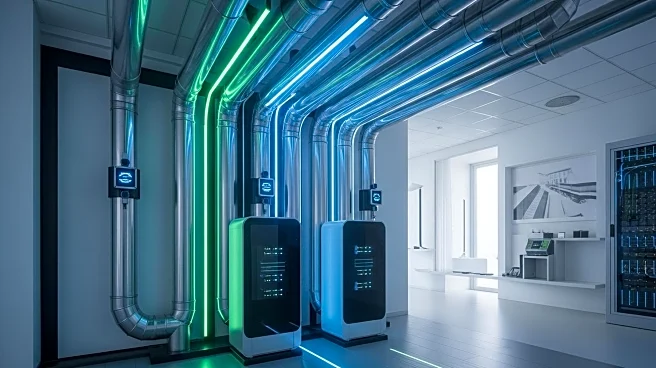What's Happening?
California lawmakers have sent two diluted bills concerning data centers to Governor Gavin Newsom's desk. Initially, the bills aimed to enforce stricter regulations on data centers regarding their power and water usage. However, amendments have significantly reduced their impact. One bill now mandates data centers to disclose water usage, but in a manner that may not be publicly accessible. The other bill, originally designed to protect energy customers from infrastructure costs driven by data centers, now merely authorizes regulators to assess if such cost shifts occur. The changes have led to opposition from groups like The Utility Reform Network, which initially supported the bills for their consumer protections. Pacific Gas and Electric (PG&E) has seen a 40% increase in data center hookup requests, prompting concerns about the environmental and economic impacts of these facilities.
Why It's Important?
The diluted bills reflect the growing tension between environmental concerns and the expansion of data centers, which are crucial for supporting technologies like artificial intelligence. Data centers require significant water and energy resources, raising concerns about their impact on local reservoirs and electricity rates. The amendments to the bills have sparked criticism from consumer advocacy groups, who argue that the changes fail to protect ratepayers from potential cost increases. The situation highlights the challenges in balancing technological advancement with environmental sustainability and consumer protection. As data centers continue to proliferate, the need for transparent and effective regulation becomes increasingly critical.
What's Next?
Governor Newsom's decision on the bills will be pivotal. If signed into law, the bills will require data centers to disclose water usage to their suppliers, potentially leading to new efficiency guidelines. However, the lack of public access to this data may limit community engagement and oversight. The ongoing debate over data center regulation is likely to continue, with stakeholders from environmental groups, tech companies, and consumer advocates vying for influence. The outcome could set a precedent for other states grappling with similar issues, as data centers expand nationwide.
Beyond the Headlines
The controversy surrounding these bills underscores broader issues of transparency and accountability in the tech industry. The reluctance to disclose water usage data points to concerns about trade secrets and competitive advantage. This situation raises ethical questions about corporate responsibility and the public's right to know about resource consumption. As data centers become integral to modern infrastructure, the need for clear and enforceable regulations that balance innovation with sustainability and public interest becomes more pressing.









